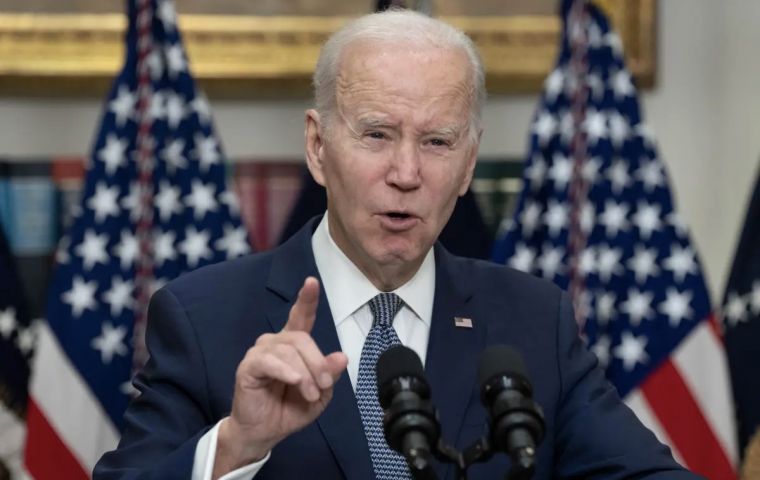MercoPress. South Atlantic News Agency
Biden says US banking system safe after Silicon Valley Bank collapse
 The FDIC also closed the New York-based Signature Bank
The FDIC also closed the New York-based Signature Bank US President Joseph Biden said his country's banking system was “safe” in the aftermath of last week's collapse of Silicon Valley Bank, a California financial giant specialized in the technology sector. Biden insisted Monday that Americans can “trust that the banking system is safe,” and said he would seek to move forward with stronger regulations.
“Thanks to the action of my administration in the last few days, Americans can trust that the banking system is safe; they can breathe easy because businesses will be able to pay their bills and their employees,” Biden pointed out while stressing that “deposits were safe.”
“What is necessary will be done so that this does not affect other countries,” Biden also highlighted.
The Board of Governors of the U.S. Federal Reserve (FED) announced that it will make additional funds available to eligible depository institutions to help ensure that banks can meet the needs of all their depositors while guaranteeing the payment of Silicon Valley Bank savers' deposits.
In a statement, the Fed argued that “this action will strengthen the banking system's ability to safeguard deposits and ensure the continued provision of money and credit to the economy, with the goal of supporting U.S. businesses and households.”
The fall of SVB, the 16th US largest in terms of assets and valuation, is the biggest collapse since that of Lehman Brothers in 2008, an event that served as a prelude to what became the international financial crisis unleashed by subprime mortgages.
In the UK, HSBC bought the British subsidiary of Silicon Valley Bank as part of an agreement with the Bank of England (BoE), which relieved UK technology companies that warned they could go bankrupt without help. The emergency solution for SVB's bankruptcy in the UK brought relief to the technology sector, following fears that key companies would not be able to access their funds.
In this regard, the Central Bank of England assured that the agreement will guarantee the continuity of banking services, minimize the disruption of the UK technology sector and support confidence in the financial system.
“Deposits will be protected, through the rescue agreement with HSBC,” said UK Finance Minister Jeremy Hunt, who stressed, “I said yesterday that we would look after our technology sector and we have worked urgently to deliver on that promise.”
SVB's crash triggered a spiral of fear, in which customers began to withdraw their funds since under US law, deposits are insured up to US$ 250,000, so customers and businesses whose funds exceeded that figure - almost 90% of Silicon Valley Bank's accounts - felt they might lose all their money. Given this free fall, which triggered a worldwide sell-off of bank shares, U.S. regulators decided to intervene and closed the bank on Friday.
The institution was left in the hands of the Federal Deposit Insurance Corporation (FDIC), an independent federal agency that was created after the banking crash of 1929 and whose mission is to guarantee and recover money from a bank's customers in the event of failure. The agency said customers who had their deposits insured would have access to their money as early as Monday and that the proceeds from the sale of the bank's assets would go to uninsured depositors.
Fearing that other banks could incur the same risk in the panic of their customers, U.S. Treasury Secretary Janet Yellen expressed her confidence in the “strength of the banking system” on Friday after meeting with the sector's main regulators, to whom she conveyed her “absolute confidence that they will take the appropriate measures”.
On Sunday, amid fears of a crisis of confidence in the banking system, the Federal Reserve and the government announced new emergency funds to protect all SVB deposits, not just those that were insured.
The U.S. authorities wanted to pull out all the stops to calm the markets. On Sunday evening, Yellen, Federal Reserve Chairman Jerome Powell, and FDIC Chairman Martin Gruenberg assured in a joint statement that all customers, including those whose funds exceed the maximum level insured by the government, will be made whole. This will affect not only Silicon Valley Bank but also another smaller entity, the New York-based Signature Bank, which was closed Sunday by the FDIC. Signature's customers were also heavily tied to the technology and cryptocurrency sector. Separately, the Federal Reserve also announced that it will offer assistance through a new funding program, which will make it easier for banks to borrow in a crisis.




Top Comments
Disclaimer & comment rulesCommenting for this story is now closed.
If you have a Facebook account, become a fan and comment on our Facebook Page!